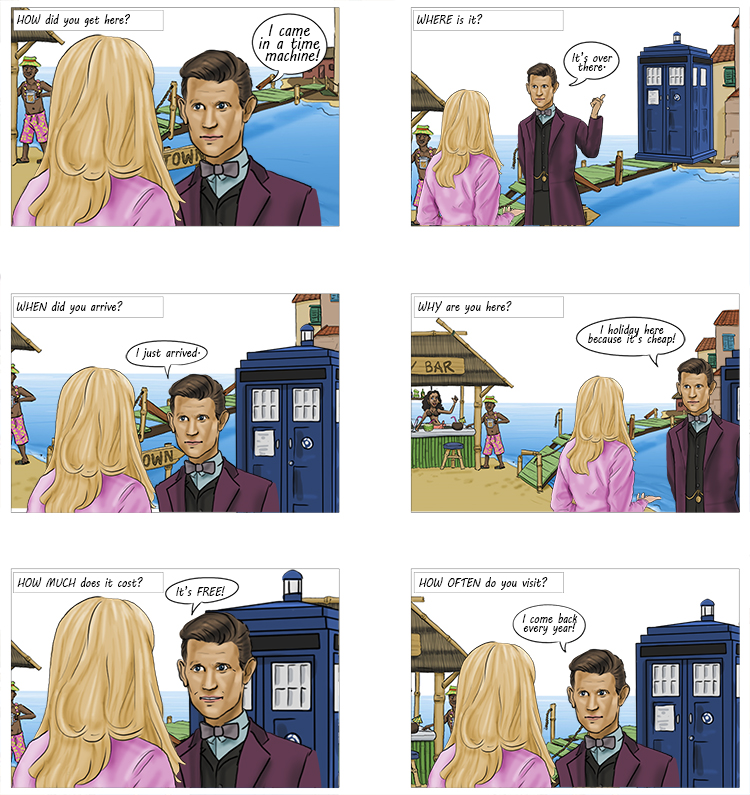Adverb 3
The last, more complicated, but most accurate and best way to decide where the adverb in a sentence is:
You just ask a question first:
HOW? WHERE? WHEN? WHY? HOW MUCH? HOW OFTEN?
First you must remember this list. We suggest using a short story.
We have created a mnemonic story around Dr Who, as 'who?' is a question.
Note: Admittedly, "who?" is not one of the questions on the list, but this is still a great way of remembering the questions.
The Dr Who story goes as follows:

So, if you're searching for possible adverbs in a sentence, first write down the six questions running the Dr Who story in your head:
How?
Where?
When?
Why?
How much?
How often?
And this will help you more easily identify any adverb in a sentence, for example:
She sang the song atrociously.
She = Pronoun Sang = Verb The = Article Song = Noun Atrociously = Adverb
('Atrociously' answers the question 'how' = Adverb)
The car drove fast.
The = Article Car = Noun Drove = Verb Fast = Adverb
('Fast' answers the question 'how' = Adverb)
I play well.
I = Pronoun Play = Verb Well = Adverb
('Well' answers the question 'how' = Adverb)
We saw the bird there.
We = Pronoun Saw = Verb The = Article Bird = Noun There = Adverb
('There' answers the question 'where' = Adverb)
We looked in the basement.
We = Pronoun Looked = Verb In the basement = Adverb phrase
('In the basement' answers the question 'where' = Adverb)
The parents looked everywhere.
The = Article Parents = Noun Looked = Verb Everywhere = Adverb
('Everywhere' answers the question 'where' = Adverb)
We will use the software program tomorrow.
We = Pronoun Will = Verb Use = Verb The = Article Software = Noun Program = Noun Tomorrow = Adverb
('Tomorrow' answers the question 'when' = Adverb)
He responded immediately.
He = Pronoun Responded = Verb Immediately = Adverb
('Immediately' answers the question 'when' = Adverb)
They arrived today.
They = Pronoun Arrived = Verb Today = Adverb
('Today' answers the question 'when' = Adverb)
We often spend Christmas with friends.
We = Pronoun Often = Adverb Spend = Verb Christmas = Noun With = Preposition Friends = Noun
('Often' answers the question 'how often' = Adverb)
We go to the cinema a lot.
We = Pronoun Go = Verb To = Preposition The = Article Cinema = Noun A lot = Adverb
('A lot' answers the question 'how often' = Adverb)
The manager checks the toilet every hour.
The = Article Manager = Noun Checks = Verb The = Article Toilets = Noun Every hour = Adverb
('Every hour' answers the question 'how often' = Adverb)
She left to avoid trouble.
She = Pronoun Left = Verb To avoid trouble = Adverb phrase
('To avoid trouble' answers the question 'why' = Adverb phrase)
Raynor plays the guitar for fun.
Raynor = Noun Plays = Verb The = Article Guitar = Noun For fun = Adverb phrase
('For fun' answers the question 'why' = Adverb phrase)
I wear my gloves to warm my hands.
I = Pronoun Wear = Verb My = Adjective Gloves = Noun To warm = Adverb phrase My = Adjective Hands = Noun
('To warm' answers the question 'why' = Adverb phrase)
We go there a lot.
We = Pronoun Go = Verb There = Adverb A lot = Adverb
('There' answers the question 'where' = Adverb)
('A lot' answers the question 'How often' = Adverb)
She worries a great deal.
She = Pronoun Worries = Verb A great deal = Adverb phrase
('A great deal' answers the question 'how much' = Adverb phrase)
He ran at ten miles per hour.
He = Pronoun Ran = Verb At ten miles per hour = Adverb phrase
('At ten miles per hour' answers the question 'how much' = Adverb phrase)




